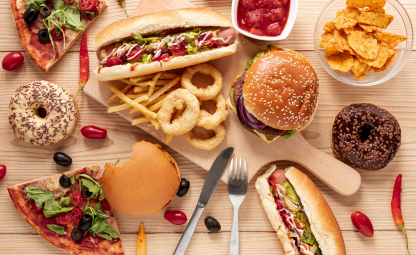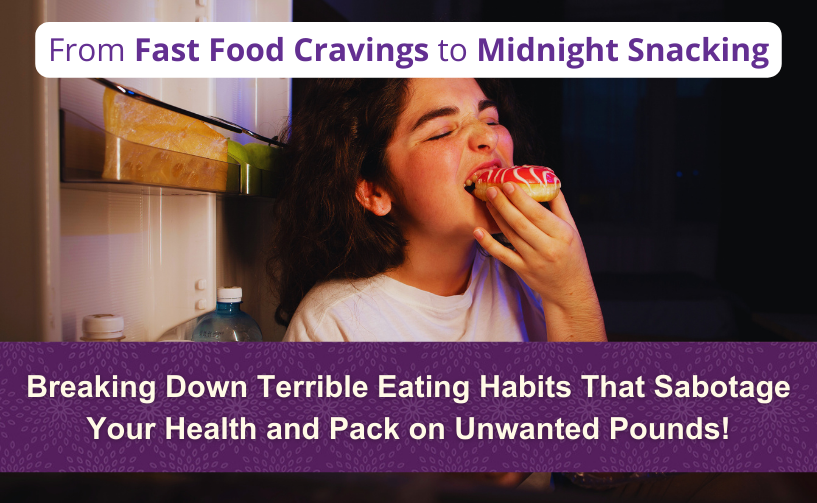Welcome to our blog, where we dive deep into the world of unhealthy eating habits and their detrimental effects on your health and well-being. In this article, we're going to tackle two common culprits: Fast Food Cravings and Midnight Snacking. These habits not only sabotage your health but also pack on unwanted pounds, making it crucial to address them head-on.
In our fast-paced lives, it's easy to fall into the trap of relying on fast food for convenience and indulging in late-night snacks for comfort. However, these habits come at a steep price. Fast food, with its high levels of calories, unhealthy fats, and additives, can wreak havoc on your body, contributing to weight gain and an increased risk of chronic diseases.
Similarly, the allure of midnight snacking can be tough to resist. Whether it's driven by stress, boredom, or disrupted sleep patterns, giving in to late-night cravings often leads to mindless eating and unhealthy food choices. Over time, these habits can derail your health goals and take a toll on your overall well-being.
But fear not! In this article, we'll break down the science behind these unhealthy eating habits, providing valuable insights and practical strategies to regain control of your dietary choices. We'll explore the reasons behind fast food addiction and the triggers that lead to midnight snacking. Armed with this knowledge, you'll be empowered to make informed decisions and foster healthier habits.
Remember, change starts with awareness and a commitment to your well-being. By understanding the detrimental effects of fast food cravings and midnight snacking, you're already taking the first step toward a healthier lifestyle. So, join us on this journey as we unravel the complexities of these eating habits and equip you with the tools to reclaim your health and bid farewell to those unwanted pounds or kilos. Let's dive in!

Understanding Fast Food Cravings
- The allure of convenience and flavour
Fast food has become a ubiquitous part of modern life, tempting us with its convenience and irresistible flavours. The fast-paced nature of our society often leaves us strapped for time, making the quick and easy options provided by fast food chains incredibly tempting. However, these seemingly innocent choices often come at a high cost to our health.
Fast food meals are typically loaded with high levels of salt, unhealthy fats, and added sugars. These ingredients not only contribute to weight gain but also increase the risk of chronic conditions such as heart disease, type 2 diabetes, and high blood pressure. Moreover, the addictive combination of fat, sugar, and salt found in fast food can make it challenging to resist these cravings.
- Identifying emotional and environmental triggers
Fast food cravings are not solely based on physical hunger; they can also be driven by emotional factors and environmental cues. Stress, boredom, loneliness, and negative emotions can often lead us to seek comfort in the familiar tastes and textures of fast food. The temporary pleasure derived from indulging in these foods can serve as a form of emotional coping mechanism, although an unhealthy one.
Additionally, the pervasive presence of fast food outlets in our surroundings can make it challenging to resist temptation. The catchy advertisements, alluring promotions, and convenient locations create a constant reminder of these indulgent options. This environmental influence can trigger cravings even when we're not consciously thinking about fast food.
To break free from fast food cravings, it's essential to recognise these triggers. Start by identifying the emotions or situations that commonly lead to the desire for fast food. Once you've pinpointed your triggers, find alternative ways to address them, such as engaging in stress-relief activities, seeking support from friends and family, or finding healthier alternatives that still provide comfort and satisfaction.
Conquering Midnight Snacking
- The dangers of late-night indulgence
Midnight snacking is a habit many of us are guilty of, but it can have significant consequences for our health and weight management. Eating late at night disrupts our natural circadian rhythm, the internal clock that regulates various bodily functions, including metabolism and digestion. When we eat during the late hours, our body is not as efficient in processing and metabolising the calories consumed, leading to weight gain over time.
Moreover, the types of foods often chosen for late-night snacking tend to be high in calories and low in nutritional value. Common late-night cravings include sugary treats, salty snacks, and high-fat comfort foods. Consuming these calorie-dense options without an opportunity to burn them off can contribute to weight gain and interfere with our overall dietary balance.

- Establishing healthier nighttime routines
Breaking the habit of midnight snacking requires establishing healthier nighttime routines. One effective strategy is to plan balanced meals and snacks throughout the day, ensuring that you are adequately nourished and satisfied by the time evening comes. This way, you reduce the likelihood of feeling intense hunger late at night.
Additionally, creating a sleep-friendly environment can help curb the impulse to indulge in late-night eating. Establish a regular sleep schedule, aiming for seven to nine hours of quality sleep per night. Avoid stimulating activities and electronic screens close to bedtime, as these can disrupt your sleep patterns and trigger cravings. Instead, engage in relaxation techniques like reading a book, taking a warm bath, or practising gentle stretching exercises.
If you find yourself experiencing true hunger pangs late at night, opt for healthier snack choices. Keep nutritious options readily available, such as sliced fruits, raw vegetables with hummus, or a small portion of low-fat yoghurt. These alternatives provide a sense of satisfaction without compromising your health or weight goals.
Conclusion
Unhealthy eating habits, such as fast food cravings and midnight snacking, can be detrimental to our health and contribute to weight gain. By understanding the underlying reasons for these habits and implementing strategies to overcome them, we can regain control over our eating patterns and improve our overall well-being. Remember, small changes can lead to significant results, so start by identifying your triggers, setting achievable goals, and seeking support when needed. With dedication and perseverance, you can break free from these terrible eating habits and pave the way for a healthier, happier life.






